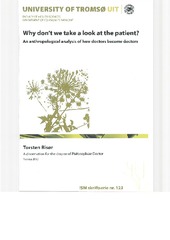Browsing ISM skriftserie by Title
Now showing items 158-161 of 161
-
When coercion moves into your home. A study of outpatient commitment in Northern Norway
(Doctoral thesis; Doktorgradsavhandling, 2016-12-08)”Når tvangen flyttes hjem i stua” Tvang overfor pasienter som bor hjemme erfares annerledes enn hvordan vi vanligvis tenker om tvang i psykisk helsevern, viser en ny studie fra UIT. Tvunget psykisk helsevern uten døgnopphold (TUD) betyr at pasienten bor utenfor sykehus, men fortsatt er underlagt tvang. Dette innebærer en avgrenset mulighet for å bruke tvang : 1. Pasienten kan hentes, eventuelt ... -
Why don't we take a look at the patient? : an anthropological analysis of how doctors become doctors
(Doctoral thesis; Doktorgradsavhandling, 2012)The present thesis is a study of how doctors learn to make clinical decisions; decisions about diagnosis and therapy of the individual patient in the context of the clinic. It is based on ethnographic fieldwork and anthropological analysis carried out in 2006-2009. The key informants are nine doctors who go through internship and the empirical field is the wards and clinics of regional hospitals, ... -
Withdrawal and exclusion : a study of the spoken word as means of understanding schizophrenic patients
(Doctoral thesis; Doktorgradsavhandling, 2005)There are literally thousands of people living among us who suffer from chronic and severe mental illness. There may be as many as one out of 100 that might be described with the diagnosis of schizophrenia. This means that most of us are likely to know, or know of, at least one person who suffers from schizophrenia. Nevertheless, most people perceive it as both distant and elusive.<br> The ... -
Young adults and seafood : using the voice of consumers to develop new seafood product concepts aimed at increasing consumption
(Doctoral thesis; Doktorgradsavhandling, 2010-09-24)Young adults do not eat seafood frequently enough because they lack knowledge about the preparation of a quick and easy meal with seafood. One of the ways to improve this situation is to offer young adults a product which is based on their needs and helps them to eat seafood more frequently. The first survey study showed a positive association between health involvement, attitudes towards seafood ...


 English
English norsk
norsk


